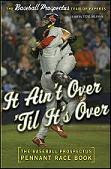Well, the offseason has certainly gotten off to a roaring start. With seven teams changing GMs and the soap opera like stories around Theo Epstein in Boston, Paul DePodesta in Los Angeles, Pat Gillick in Philadelphia, Josh Byrnes in Arizona, and Gary Hunsaker in Tampa Bay (although not officially a GM), there's lots for the baseball fan to take note of.
The number of changes at the top has resulted in lots of discussion about the increasing notoriety, celebrity, and importance of GMs in the modern game. David Pinto had a nice post on the subject titled GM Stock last week. Pinto argues that free agency and the information revolution have had much to do with innovation in baseball being pushed up the ladder to the GM and away from the managers on the field. That trend has been accelerated by the debate that Moneyball started between the old school and the new.
I would also add that the amount of money now at stake in the game has upped the ante for the owners. That has led to owners who treat their teams more as investments and less as play things where efficient and innovative practices are sought out. And that brings us to the culture of baseball.
Last weekend I was re-reading Men At Work: The Craft of Baseball by George Will published in 1990, and ran across a passage that does a great job of painting the picture of baseball's management culture as it existed before the information revolution had made much of an impact and even as it exists in some places still today.
"To the familiar classifications of social systems, now add a new category to cover the peculiar governance of baseball. To aristocracy, plutocracy and democracy add baseball's contribution to government: 'palocracy,' government by old pals. Baseball has traditionally been run by men whose lives have been intersecting and entwined for decades. They have known one another from the rocky playing fields and spartan offices of the low minor leagues all the way up to the manicured playing fields and well-appointed suites of the major leagues. You do not talk long with a baseball person you hear the phrase 'baseball person.' Often it is accompanied by a negative: So-and-so is 'not a baseball person.' No adjective is required, thank you very much. A baseball person is a good baseball person. A palocracy can make for kinder, gentler governance, but it also can make the world safe for mediocrity..."
"Closed systems, such as tenured university faculties or diplomatic corps or military services, are vulnerable to systemic mediocrity. People who have gone to the same schools, climbed the same career ladders, absorbed the same values and assumptions and expectations, become intellectually insular and professionally self-protective. They forgive one another their mistakes, and mediocrity becomes cozy."
One of the effects of the larger role of GMs and the Moneyball debate has been to start to break the palocracy and replace it with a meritocracy that uses all of the tools available to build a winning team. And that is very good for baseball.
Wednesday, November 09, 2005
Palocracy
Posted by
Dan Agonistes
at
6:24 PM
![]()
Subscribe to:
Post Comments (Atom)
125x125_10off+copy.jpg)



No comments:
Post a Comment